最新仁爱版八年级英语下册期末总复习知识点汇总
仁爱版八年级英语下册知识点归纳
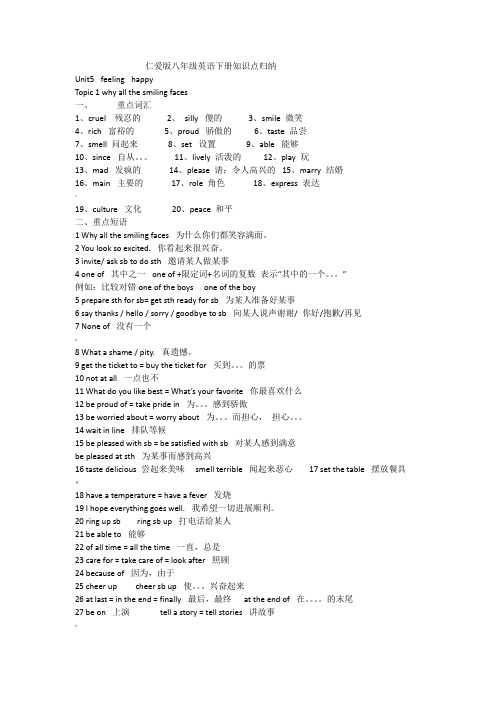
仁爱版八年级英语下册知识点归纳Unit5 feeling happyTopic 1 why all the smiling faces一、重点词汇1、cruel 残忍的2、silly 傻的3、smile 微笑4、rich 富裕的5、proud 骄傲的6、taste 品尝7、smell 问起来8、set 设置9、able 能够10、since 自从。
11、lively 活泼的12、play 玩13、mad 发疯的14、please 请;令人高兴的15、marry 结婚16、main 主要的17、role 角色18、express 表达~19、culture 文化20、peace 和平二、重点短语1 Why all the smiling faces 为什么你们都笑容满面。
2 You look so excited. 你看起来很兴奋。
3 invite/ ask sb to do sth 邀请某人做某事4 one of 其中之一one of +限定词+名词的复数表示“其中的一个。
”例如:比较对错one of the boys one of the boy5 prepare sth for sb= get sth ready for sb 为某人准备好某事6 say thanks / hello / sorry / goodbye to sb 向某人说声谢谢/ 你好/抱歉/再见7 None of 没有一个<8 What a shame / pity. 真遗憾。
9 get the ticket to = buy the ticket for 买到。
的票10 not at all 一点也不11 What do you like best = What’s your favorite你最喜欢什么12 be proud of = take pride in 为。
感到骄傲13 be worried about = worry about 为。
最新仁爱版八年级英语下册总复习知识点归纳大全(15页)
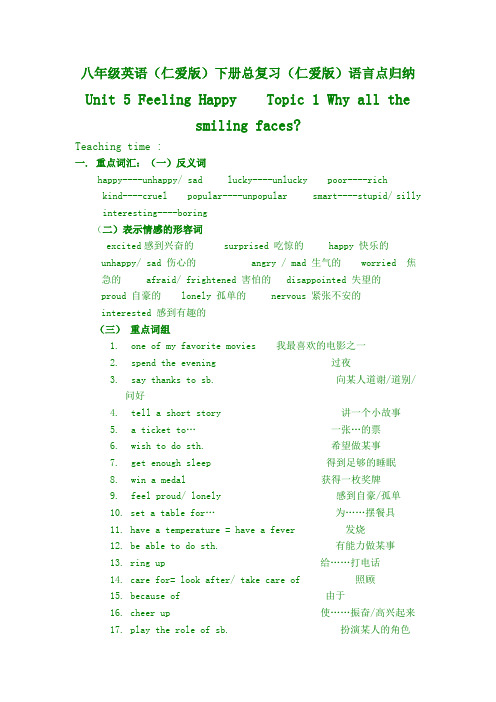
八年级英语(仁爱版)下册总复习(仁爱版)语言点归纳Unit 5 Feeling Happy Topic 1 Why all thesmiling faces?Teaching time :一.重点词汇:(一)反义词happy----unhappy/ sad lucky----unlucky poor----rich kind----cruel popular----unpopular smart----stupid/ silly interesting----boring(二)表示情感的形容词excited感到兴奋的 surprised 吃惊的 happy 快乐的unhappy/ sad 伤心的 angry / mad 生气的 worried 焦急的 afraid/ frightened 害怕的 disappointed 失望的proud 自豪的 lonely 孤单的 nervous 紧张不安的interested 感到有趣的(三)重点词组1.one of my favorite movies 我最喜欢的电影之一2.spend the evening 过夜3.say thanks to sb. 向某人道谢/道别/问好4.tell a short story 讲一个小故事5. a ticket to… 一张…的票6.wish to do sth. 希望做某事7.get enough sleep 得到足够的睡眠8.win a medal 获得一枚奖牌9.feel proud/ lonely 感到自豪/孤单10.set a table for… 为……摆餐具11.have a temperature = have a fever 发烧12.be able to do sth. 有能力做某事13.ring up 给……打电话14.care for= look after/ take care of 照顾15.because of 由于16.cheer up 使……振奋/高兴起来17.play the role of sb. 扮演某人的角色18.be on 上演; 放映19.at first 首先20.fall into 落入21.be afraid of doing sth. 害怕做某事22.in/at the end = at last 最后23.go mad 发疯e into being 形成25.be full of 充满…26.be popular with… 受……喜爱27.make peace 制造和平28.end/begin with… 以……结尾/开始二.重点句型及重点语言点2. Because he can’t get a ticket to The Sound of Music. 因为他没有买到《音乐之声》的票.to 表“的”,常见的搭配如下:a ticket to The Sound of Music 一张《音乐之声》的票the answer to the question 问题的答案the key to the door 门的钥匙the way to…去…..的路1. How nice! 真是太好了!What a shame! 真可惜!What bad news! 多糟的消息!这三句全都是感叹句.它们的结构为:1)How + adj./ adv. + 主语 + 谓语! 如: How moving the movie is! How fastthe boy runs!2)What + a/an + adj. + n. (可数名词的单数) + 主语 + 谓语! 如: What abig apple (it is)!3)What + adj. + n.(可数名词的复数或不可数名词) + 主语 + 谓语! 如:What interesting stories (they are)! What hard work( it is)!4.I’ll ring up Michael later. 稍后我打电话给迈克.ring up sb. = call/ ring/ phone sb. = give sb. a ring/ call/ telephone = make a telephone to sb.当宾语为代词时, 只能放中间.如: ring me/him/her up3. I think Mr. Lee likes it very much and really wishes to watch it. 我认为李老师非常喜欢它而且的确想去看. wish/ hope to do sth.希望做某事与 wish 相关的结构还有: wish/ hope + that引导的从句;如:I wish/ hope (that) we will win.我们可以说wish sb. to do sth. 而不能说hope sb. to do sth.;6. I’m sure Mr. Lee will be surprised and happy! 我确信李老师会很惊奇也很高兴!be surprised “感到惊奇的”, 主语一般为人.be surprising “令人惊奇的”, 主语一般为物.类似的有:interested/ interesting; excited/ exciting; bored/ boring 5.…since they were not able to go.……既然他们不能去.can与be able to 二者都表“能;会”,在指“一般能力”时,常互换。
仁爱版英语八年级下册_期末专项复习(完形填空)

期末专项复习(一)考查内容: 八年级(下册)Unit 5~Unit 8完形填空(一)I am a lovely and happy boy. I love life. I 1 my parents, teachers, friends and classmates, and I also love my city and the world. But sometimes I am in trouble. I want to do everything 2 . I want to be a good boy. I want everyone to love me. IfI do something 3 , I'll feel unhappy. I'll think I am good for nothing and I'll be4 for some time. Then they5 tell me the following.“You can't do all things 6 than anyone else. You can't do all things at a time. You have to decide 7 comes first, and then do that. ”“You'll have to learn to accept yourself. You'll have to live with your limitations. You are just 8 . You're wonderful. It's your duty to be who you are. ”It's true that I can't make 9 good, but I'll try my best. Then I'll become myself-a 10 child. So my world will become beautiful and be full of happiness. ( ) 1. A. dislike B. love C. follow D. remember ( ) 2. A. well B. good C. bad D. nice( ) 3. A. exciting B. interesting C. wrong D. right( ) 4. A. happy B. upset C. pleased D. proud ( ) 5. A. often B. never C. seldom D. nearly ( ) 6. A. well B. good C. better D. best( ) 7. A. something B. anything C. which D. what( ) 8. A. myself B. yourself C. himself D. yourselves ( ) 9. A. other things B. nothing C. everything D. anything ( ) 10. A. funny B. lucky C. lonely D. lovely(二)At lunch time, Bonnie and Ruth sat together eating lunch as usual. Ruth and Bonnie were best friends. They 1 sandwiches, cupcakes and almost everything.But today things were different. Bonnie looked upset, and Ruth did not know why. "Why are you sad today, Bonnie? ”Ruth asked. “Because my daddy 2 his jobyesterday, ” she said. “And we may have to move. My mom and dad are very unhappy and they always argue(争吵). I am 3 .What is going to happen to us? ”Bonnie's news made Ruth very sad, too. What would life be like 4 Bonnie? What could she do to help her friend? When Ruth went home she told her mom the bad 5 .“What can I do to help? ”she asked.“I'm not sure, Ruth, ” said her mother sadly.Ruth thought and thought.“What can I do? ”she 6 .The next day was Saturday and Ruth woke up very early. She ate a quick breakfast, and then went to find her friends. They all decided to help Bonnie. The children 7 their money. They got three hundred dollars! Ruth's mom took them to the store and they bought food, soap and all kinds of things that a person might need.When they left the store they went to Bonnie's house and each of the children8 carried a bag to the door, rang the doorbell and ran. They had so much fun with9 secret surprise! They knew it would make Bonnie very happy.Ruth felt happy too, because she helped her friend. She knew it wasn't much, but all she needed to do was to show her friend that she 10 . I think Bonnie got the message, don't you?( ) 1. A. found B. made C. shared D. bought ( ) 12. A. changed B. lost C. enjoyed D. got( ) 3. A. worried B. lonely C. disappointed D. surprised ( ) 4. A. to B. with C. for D. without ( ) 5. A. story B. result C. news D. report ( ) 6. A. shouted B. laughed C. talked D. wondered ( ) 7. A. collected B. saved C. raised D. spent ( ) 18. A. usually B. quietly C. easily D. quickly ( ) 9. A. their B. his C. her D. its( ) 10. A. helped B. cared C. understood D. knew(三)We live in a busy world, so we really need to relax ourselves. But how to take a break when you can't get a vacation? Please take these 1 .Action One: Turn offWhen you are falling asleep, maybe there are some devices(设备)around you. It is one of the 2 why you can't have a good night's sleep. It's also why you can 3 awake(醒着的)in bed for hours, and wake up in a bad mood. So don't use any device 4 an hour before bed-turn them off.Action Two: Have your own timeA great way to avoid stress is to make sure you have some time just for 5 daily. You may read something interesting, listen to music, or just drink your coffee slowly and do 6 . It's your 7 time and no one can take it from you.Action Three: Meditate(冥想)It doesn't need to 8 a long time. You may just sit for 2 minutes and try to empty(清空)your mind. It can help your heart jump more slowly. It 9 makes your body in a good condition. So give it a try.That's 10 you can be relaxed and comfortable without having to take a vacation.( ) 1. A. ideas B. actions C. rules D. questions( ) 2. A. reasons B. facts C. result D. ways( ) 13. A. make B. come C. look D. stay( ) 4. A. less than B. more than C. at least D. at last( ) 5. A. myself B. yourself C. ourselves D. themselves ( ) 16. A. nothing B. anything C. everything D. something( ) 7. A. busy B. work C, free D. business( ) 8. A. take B. spend C. cost D. use( ) 9. A. too B. either C. never D. also( ) 10. A. why B. what C. when D. how(四)Clothes are important in our life. Different people wear 1 clothes. Now let's2 some people talking about clothes.Hello, my name's Betty. I started working this year, so I'm able to get new clothes more often 3 before. There are different people in my working place every day. If someone sees me in 4 once, I don't like to go out in it again. I like to wear bright colors and always dress up when I go to parties. I buy all kinds of clothes and I try to follow the latest way of 5 .Hi, I'm Jack. I don't have much to say about clothes. Shopping 6 clothes isn't really the way of life I'm interested in. Since I'm still at a college, I don't really mind7 . I have two jackets and I often wear 8 . I know least about the way of dressing.I don't like the serious look.My name is Alice. I'd like to say that my clothes have to be comfortable and make me 9 easy as soon as I put them on. Sometimes I buy clothes in some small markets-they're less expensive there. I go shopping for clothes about once a month, though. If I see 10 and fit for me, I would maybe go for it there and then.( ) 1. A. the same B. different C. beautiful D. comfortable ( ) 2. A. listen to B. hear C. to listen to D. to hear( ) 3. A. as B. like C. than D. long( ) 4. A. something B. anything C. nothing D. everything( ) 5. A. dress B. dressing C. dresses D. to dress( ) 6. A. of B. in C. for D. on( ) 7. A. what I wear B. what do I wear C. what I wore D. what did I wear ( ) 8. A. it B. them C. their D. they( ) 9. A. feel B. feels C. feeling D. to feel( ) 10. A. something comfortable B. anything comfortableC. comfortable somethingD. comfortable anything(五)Traffic rules help to keep order on the road. They also help to keeppeople__1__.The pedestrian(行人)has as many rules to__2__as the driver of a car. You shouldwalk on the sidewalk(人行道)or at the side of the road. Always look__3__before you walk across the street.If you like riding a bike, don't ride in the middle of the road or run__4__red traffic lights. When you ride a bike with a friend, don't look around or talk. If you drive a car, you should__5__at the traffic lights. You must always__6__a seat belt(安全带). Without belts__7__the driver and the passengers may be badly hurt in a sudden accident.You may not need to take a bus, but__8__if you have to travel in one. Get on or get off a bus only when it comes to a__9__. When it is full, don't try to get inside__10__you may fall off.Traffic rules are also called Road Safety rules. The maxim(格言)for all road users is “ Thinking ab out others”.( ) 1. A. healthy B. safe C. happy D. careful( ) 2. A. follow B. make C. break D. pass( ) 13. A. happy B. happily C. careful D. carefully( ) 4. A. through B. across C. along D. around( ) 5. A. speed up B. go ahead C. get off D. slow down( ) 6. A. take B. wear C. carry D. bring( ) 7. A. half B. none C. both D. all( ) 8. A. look around B. lake care C. take a seat D. look back( ) 9. A. sign B. stop C. corner D. crossing( ) 10. A. and B. so C. or D. but(六)I'm taking my family to other countries to have a trip. We are going by train 1 New York, and then take a ship to Europe. When we __2__ in Europe, we're going to some countries for sightseeing. We'll go to places__3__by train or by bus. We are planning to fly home.It __4__ us a long time to decide where to go, but I think we have planned a very __5__ tip. We will go to England, France and Italy. My wife is very interested in __6__ to France because she is a teacher of French. And my brother is looking __7__to a trip to Italy because he speaks Italian very well.We also __8__ about how we would go to Europe. At first we wanted to fly because it would be __9__ and would save more time. But my brother likes to take a boat trip and the children __10__ that, too. What do you think of my trip?( ) 1. A. to B. for C. in D. at( ) 2. A. got B. reach C. arrive D. get( ) 3. A. also B. too C. either D. neither( ) 4. A. paid B. took C. spent D. cost( ) 5. A. pleasure B. interested C. interest D. interesting( ) 16. A. looking B. going C. coming D. seeing( ) 7. A. forward B. after C. over D. for( ) 8. A. spoke B. told C. said D. talked( ) 9. A. faster B. fast C. quickly D. more quickly ( ) 10. A. have B. liked C. enjoy D. enjoyed(七)Many Americans like to have their holidays in__1__countries. One day an American__2__comes to China. This is her first time to China and she wants to__3__some friends there. She meets a Chinese. This Chinese wants to talk__4__with the American. When he sees her, he comes up and says“__5__”to her, then he begins his first talk with someone__6__an English-speaking country. “How old are you? ” the Chinese__7__. “ I'm__8__. Please don't ask a lady(女士)about her__9__, ” answers the woman. The Chinese is surprised. He doesn't know__10__. Can you help him?( ) 1. A. another B. the other C. other D. others( ) 2. A. man B. boy C. woman D. child( ) 3. A. make B. making C. having D. do( ) 4. A. with English B. with Chinese C. in English D. in Chinese ( ) 5. A. OK B. Hello C. Sorry D. Goodbye ( ) 6. A. in B. at C. of D. from( ) 7. A. says B. tells C. talks D. speaks( ) 8. A. sure B. worried C. glad D. sorry( ) 9. A. supper B. age C. job D. family( ) 10. A. how B. why C. what D. which(八)There was once a man who was very rich but very tightfisted(吝啬的)at the same time. Nobody__1__him in the village. One day he said to them, “I know you don't like me. When I__2__, I will give everything to you. Then everyone will be__3__. ”Even then nobody believed him. The rich man couldn't__4__why they didn't believe him. One day he went for a walk. Under a tree he happened to hear a pig and a cow__5__.The pig said to the cow, "Everybody likes you__6__nobody likes me. Why? When I provide people with meat, ham(火腿)and so on, I give three or four things to them. But you give only one thing-milk. Why do people like you__7__but not me? ”The cow answered, "Look, I give them milk while I'm__8__. They see that I am generous(慷慨的)with what I__9__. But you don't give them anything while you're alive. Only after you're dead do you give them meat, ham and so on. People don't believe in the__10__, they believe in the present(现在). If you give while you are alive, people will like you. "From that moment on, the rich man wasn't tightfisted any more. Everyone began to like him. And he felt quite happy.( ) 1. A. believed B. liked C. hated D. knew ( ) 2. A. die B. leave C. return D. arrive ( ) 3. A. frightened B. happy C. angry D. safe ( ) 4. A. agree B. understand C. remember D. forget ( ) 5. A. crying B. laughing C. singing D. talking ( ) 6. A. because B. so C. but D. or( ) 7. A. sometimes B. all the time C. at the beginning D. in the end ( ) 8. A. alive B. dead C. busy D. free ( ) 9. A. like B. have C. eat D. say( ) 10. A. lifetime B. competition C. friendship D. future期末专项复习(一)答案(一)1. B【解析】下文中有一个also说明这里指的也是同一种情况, 下文的动词是love, 所以这里也选love。
仁爱版英语八年级下册知识点总结

仁爱版八年级下册期中复习资料Unit 51. You look excited\angry\disappointed\upset\frightened. 你看起来兴奋|生气|失望烦躁|惊恐。
2. 感官系动词:look 看起来smell 闻起来taste 尝起来sound 听起来feel 摸|感觉起来3. 系表结构:系动词+形容词go mad get wet get angry turn greenfall asleepfeel alittle more(confident\ comfortable) belost=get lost4. go to the movies=go to thecinema=watch\see a film 看电影5. one of + 可数的复数形式It ’s one m ofy favorite movies.6. prepare for 为做准备 6.say thanks to sb. 向某人致谢7. be popular with 受欢迎8.be kind\ cruelto sb. 对某人友好|残忍9. a ticket to 的入场券10.set the table 摆放餐具11.to do sth. It ’s seems that12.We are moved by the movingstory. 前者修饰人,后者修饰物13.be proud ofbe pleased withbe worried aboutbe excited about \at sth.be sorry forbe interested in sth.be grateful to sb.be strict with sb.be strict about \in sth.be angry with\at sb.be angry at\about sth.be nervous aboutbetired of sth.=be bored with sth.be surprised at sth.be surprised to do sth.be afraid of(doing) sth14.can (not )=be(not )able to will be able to (其将来时)15.have a temperature \fever 发烧16.ring sb. up=call sb. 给某人打电话17. care for=take care of=lookafter 照顾18. o n the way to 在去的路上18. feel lonely live alone 前者形容词修饰系动词,后者副词修饰动词19. 代词|名词短语because+句子20. on+具体描述的时间段21.fall into 掉入fall down 倒塌22. in the end=at last=finally 最后e into being 形成、成立于(一般为过去式came)24. be full of=be filled with 充满了,被填满了25. make peace with 与某人和解Topic21.do well\ badly in 在做得好|不好2.have a talk with sb. 与某人交谈3. at one ’s 在a g某e 个年纪4.make friends with sb. 与某人交朋友5. tell jokes 讲笑话6.fail the exam= not passthe exam 考试不及格7. some suggestions=somepieces of advice一些建议(前者可数,后者不可数)8. happen to sb.\sth. (事情)发生在身上happen to do sth. 碰巧9. t ake part in activities10. w ith the help of sb. 12.clap onehands 鼓’掌s13. make faces 做鬼脸14. a ll the time 一直15. t ake a wlk=go for a walk 散步16. calm down17. a t the end of themonths 在月末18.smile at life 笑对人生19. l earn by oneself=teach oneself 自学learn sth. from sb. 向某人学习20. g et along(well )with sb. 与某人相处(融洽)21. p ut on a play 上演剧目22. in a bad\good mood in good\bad health ingood\bad\high\low spirits23. make+宾语+do\adj.\n. make her laugh\excited\monitor let sb. do sth.24.get together with sb. 与某人团聚25. get bake to sth. 回到某事上26. bring bake a sense of happiness 找回快乐的感觉Unit6 Topic11. go on a three-day visit a on e-meter-tall boy2. find out 查明3. make a decision=decide to do sth. 做决定4. hard \soft sleeper 硬|软卧5. at the price of 60 yuan6.in bad\good condition 条件糟糕|好7.arrive at+ 小地方in+ 大地方= reach to =get to8. total cost 总花费9. booka room=make a room reservation 预定一个房间10. tell|ask sb. (not) to dosth.11.a roomwithouta bathroom or air conditioning 12.astandard room for one person13.workout the cost of the trip 计算work out the problem 解决14. come up with an idea 提出15.ea ch≥2(river\street )every ≥3 either两( 者之一) both=2all ≥肯3(定) none ≥(3否定)16.be drawn 被抽到nd safely 18.have a good rest 好好休息19.in the open air 在户外20. anexciting experience have noexperience (前者经历、可数,后者经验、不可数)21. placesof interest 名胜古迹22.local people strangerU6T21. be busy doing sth. 忙于做某事2. on vacation 在度假3.help sb. (to) do sth.4. make a plan plan to do sth. 计划做某事5. come along with sb. 跟随某人6. at the foot \top of 在的脚下|顶上7.spread over an area of 40 km 28. the beginning of 的开始9. by the way 顺便问一下10.take out 拿出来11.on both sides of on each\either side of 12.tell good from bad 辨别好坏13.in onto 的区别14.pull-push 拉-推15.step on 16.in all directions 四面八方17.lookfor space to park bikes 18. walk throughthe passage 19.take photos 拍照片20. pushone ’s way o挤ut开、推进(道路)21.out of sight 看不见22.get on\off 上|下车23.can’thelp doing sth.忍不住做某事24.shout atsb. to do sth .25.havefun doing sth. 高兴地做某事26. realize one ’sdream=c t r o u m e e27.everywhere=here and there 28. especially 29. make sure 确保U6T31.atraffic accident2.Many passengers were hurt. be badly hurt=hurt badly3.becrazy about sth. 热衷于be crazyabout sb. 迷恋、爱上.4.causeair pollution 造成空气污染5.get used todoing sth. 习惯于做某事used to do sth. 过去常常做某事6..inpublic 在公共场合7.die(动)dead(形)death(名)8.slowdown 减速9.the opposite direction 相反的方向10.avoid doing sth. 避免做某事11.runinto 撞到12.rush to 冲向13.careful-careless 细心-粗心carefully-carelessly14.get afine 罚款15.indanger 处于危险中16. instead of doing sth 而不是17.warnsb. (not) to do sth. 警告、提醒某人(不)做某事warn about\of againststh.18.introuble causetrouble I ’m sorry to trouble yo不u.好意思打扰你了。
仁爱英语八年级下册知识点归纳
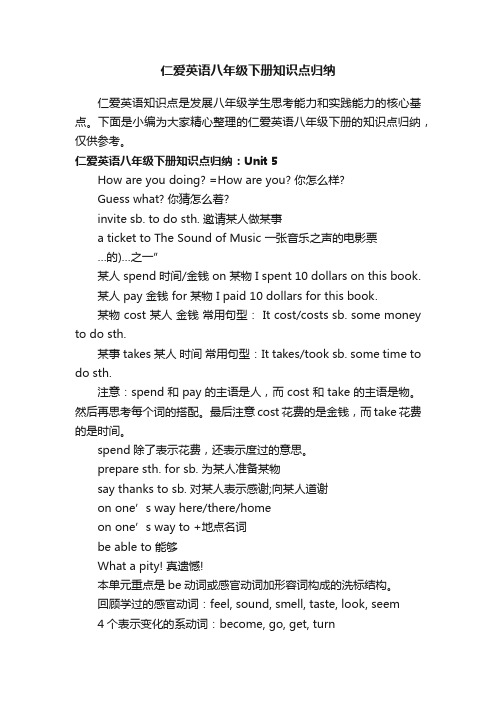
仁爱英语八年级下册知识点归纳仁爱英语知识点是发展八年级学生思考能力和实践能力的核心基点。
下面是小编为大家精心整理的仁爱英语八年级下册的知识点归纳,仅供参考。
仁爱英语八年级下册知识点归纳:Unit 5How are you doing? =How are you? 你怎么样?Guess what? 你猜怎么着?invite sb. to do sth. 邀请某人做某事a ticket to The Sound of Music 一张音乐之声的电影票…的)…之一”某人 spend 时间/金钱 on 某物 I spent 10 dollars on this book.某人 pay 金钱 for 某物 I paid 10 dollars for this book.某物 cost 某人金钱常用句型: It cost/costs sb. some money to do sth.某事 takes 某人时间常用句型:It takes/took sb. some time to do sth.注意:spend和pay的主语是人,而cost和take的主语是物。
然后再思考每个词的搭配。
最后注意cost花费的是金钱,而take花费的是时间。
spend除了表示花费,还表示度过的意思。
prepare sth. for sb. 为某人准备某物say thanks to sb. 对某人表示感谢;向某人道谢on one’s way here/there/homeon one’s way to +地点名词be able to 能够What a pity! 真遗憾!本单元重点是be动词或感官动词加形容词构成的洗标结构。
回顾学过的感官动词:feel, sound, smell, taste, look, seem4个表示变化的系动词:become, go, get, turnWhat’s the matter with sb.? 某人怎么了?Which movie do you like best? = What’s your favorite movie?注意类似exciting-excited, interesting-interested, surprising-surprised 的区别:-ing翻译为“令人…的”,而-ed翻译为“感到…的”,所以-ing修饰的是物,而-ed修饰的是人。
八年级下册仁爱版英语知识点总结

八年级下册仁爱版英语知识点总结对知识的渴求是人类的自然意向,任何头脑健全的人都会为获取知识而不惜一切,下面小编给大家分享一些八年级下册仁爱版英语知识,希望能够帮助大家,欢迎阅读!八年级下册仁爱版英语知识1【重点短语】1.be busy doing sth 忙于做某事be busy with sth. 忙于某事2.on vacation度假3.work out 算出,制定,完成4.in the center of 在……中央5.can’t wait to do sth 迫不及待做某事can’t help doing sth 情不自禁做某事6.one and a half hours= one hour and a half一个半小时7.be surprised at sth. 对某事感到惊奇be surprised to do sth. 惊奇于做某事8.in all directions四面八方9.a parking lot 一个停车场10. push one’s way out从人群中挤出来11.at last =in the end =finally最后,终于12.be famous for 因为……而著名be famous as 作为……而著名13.have fun (in) doing sth. 从做某事中获得乐趣14.thank goodness 谢天谢地15.as soon as 一……就……16.be full of…满的,充满的17.make a plan 制定一个计划18.lie in 位于……内(指某一范围之内)lie on 与……紧挨着(接壤,不管辖)lie to 隔……相望(不接壤,不管辖)19.be/get lost 迷路20.take out 拿出21.step on 踩,踏22.ten meters long/wide/high十米长/宽/高【词形转换】1.north n.北,北方northern adj.北方的,北部的2.mean v.意味着meaning n.意义,含义meaningful adj.重要的,重大的,意味深长的3.crowd n.[C]人群v.拥挤crowded adj.拥挤的4.experience v.经历n.经历[C];经验[U]experienced adj.有经验的【重点句型】1.Would you like to come to China for your vacation?你愿意来中国度假吗?2.I can’t wait to see it.我迫不及待想看它了。
专题05 时间状语从句-八年级英语下期末专项复习(仁爱版)

专题05 时间状语从句第一部分语法1. 引导时间状语从句的连词2. when,while,as引导时间状语从句的区别when,while,as显然都可以引导时间状语从句,但用法区别非常大。
①when可以和延续性动词连用,也可以和短暂性动词连用;而while和as只能和延续性动词连用。
Why do you want a new job when you’ve got such a good one already?你已经找到如此好的工作,为何还想再找新的?(get为短暂性动词)Sorry, I was out when you called me.对不起,你打电话时我刚好外出了。
(call为短暂性动词)Strike while the iron is hot.趁热打铁。
(is为延续性动词,表示一种持续的状态)The students took notes as they listened.学生们边听课边做笔记。
(listen为延续性动词)②when从句的谓语动词可以在主句谓语动作之前、之后或同时发生;while和as从句的谓语动作必须是和主句谓语动作同时发生。
a. 从句动作在主句动作前发生,只用when。
When he had finished his homework, he took a short rest. (finished先发生)当他完成作业后,他休息了一会儿。
When I got to the airport, the guests had left. (got to后发生)当我赶到飞机场时,客人们已经离开了。
b. 从句动作和主句动作同时发生,且从句动作为延续性动词时,when,while,as都可使用。
①When / While / As we were dancing, a stranger came in. (dance为延续性动词)当我们跳舞时,一位陌生人走了进来。
②When / While / As she was making a phonecall, I was writing a letter. (make为延续性动词)当她在打电话时,我正在写信。
仁爱版八年级下册英语期末总复习:各单元语法知识点提纲(全面!)
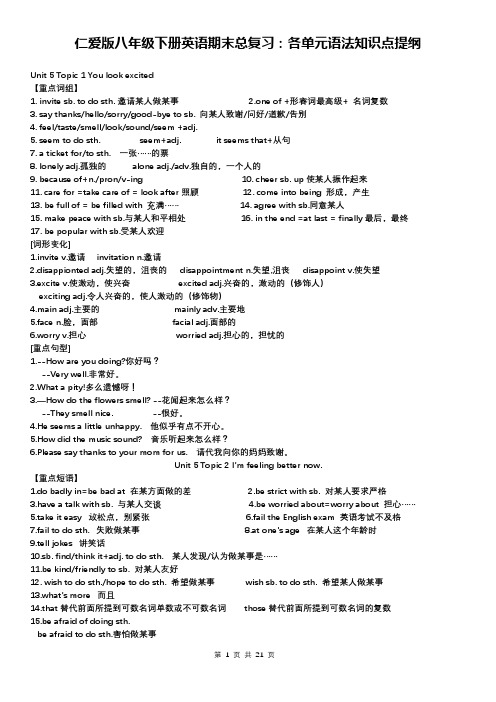
仁爱版八年级下册英语期末总复习:各单元语法知识点提纲Unit 5 Topic 1 You look excited【重点词组】1. invite sb. to do sth. 邀请某人做某事2.one of +形容词最高级+ 名词复数3. say thanks/hello/sorry/good-bye to sb. 向某人致谢/问好/道歉/告别4. feel/taste/smell/look/sound/seem +adj.5. seem to do sth. seem+adj. it seems that+从句7. a ticket for/to sth. 一张……的票8. lonely adj.孤独的alone adj./adv.独自的,一个人的9. because of+n./pron/v-ing 10. cheer sb. up使某人振作起来11. care for =take care of = look after照顾12. come into being 形成,产生13. be full of = be filled with 充满……14. agree with sb.同意某人15. make peace with sb.与某人和平相处16. in the end =at last = finally最后,最终17. be popular with sb.受某人欢迎[词形变化]1.invite v.邀请 invitation n.邀请2.disappionted adj.失望的,沮丧的disappointment n.失望,沮丧disappoint v.使失望3.excite v.使激动,使兴奋excited adj.兴奋的,激动的(修饰人)exciting adj.令人兴奋的,使人激动的(修饰物)4.main adj.主要的mainly adv.主要地5.face n.脸,面部facial adj.面部的6.worry v.担心worried adj.担心的,担忧的[重点句型]1.--How are you doing?你好吗?--Very well.非常好。
仁爱版英语八年级下册知识点详解
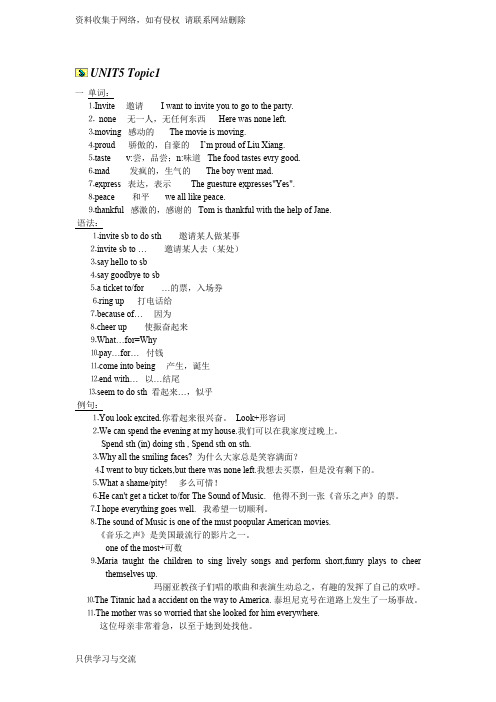
UNIT5 Topic1一单词:⒈Invite 邀请I want to invite you to go to the party.⒉none 无一人,无任何东西Here was none left.⒊moving 感动的The movie is moving.⒋proud 骄傲的,自豪的I’m proud of Liu Xiang.⒌taste v:尝,品尝;n:味道The food tastes evry good.⒍mad 发疯的,生气的The boy went mad.⒎express 表达,表示The guesture expresses"Yes".⒏peace 和平we all like peace.⒐thankful 感激的,感谢的Tom is thankful with the help of Jane.语法:⒈invite sb to do sth 邀请某人做某事⒉invite sb to …邀请某人去(某处)⒊say hello to sb⒋say goodbye to sb⒌a ticket to/for …的票,入场券⒍ring up 打电话给⒎because of… 因为⒏cheer up 使振奋起来⒐What…for=Why⒑pay…for…付钱⒒come into being 产生,诞生⒓end with…以…结尾⒔seem to do sth 看起来…,似乎例句:⒈You look excited.你看起来很兴奋。
Look+形容词⒉We can spend the evening at my house.我们可以在我家度过晚上。
Spend sth (in) doing sth , Spend sth on sth.⒊Why all the smiling faces? 为什么大家总是笑容满面?⒋I went to buy tickets,but there was none left.我想去买票,但是没有剩下的。
仁爱英语八年级下册知识点总结
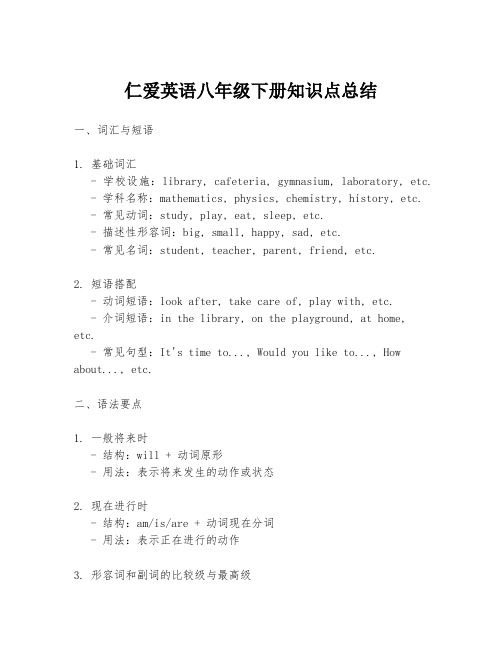
仁爱英语八年级下册知识点总结一、词汇与短语1. 基础词汇- 学校设施:library, cafeteria, gymnasium, laboratory, etc. - 学科名称:mathematics, physics, chemistry, history, etc. - 常见动词:study, play, eat, sleep, etc.- 描述性形容词:big, small, happy, sad, etc.- 常见名词:student, teacher, parent, friend, etc.2. 短语搭配- 动词短语:look after, take care of, play with, etc.- 介词短语:in the library, on the playground, at home, etc.- 常见句型:It's time to..., Would you like to..., How about..., etc.二、语法要点1. 一般将来时- 结构:will + 动词原形- 用法:表示将来发生的动作或状态2. 现在进行时- 结构:am/is/are + 动词现在分词- 用法:表示正在进行的动作3. 形容词和副词的比较级与最高级- 比较级:通常加-er 或使用more,less- 最高级:通常加-est 或使用most4. 可数名词与不可数名词- 可数名词:可以用数字计数的名词- 不可数名词:不能用数字计数的名词5. 代词的使用- 人称代词:I, you, he, she, it, we, they- 物主代词:my, your, his, her, its, our, their- 反身代词:myself, yourself, himself, herself, itself, ourselves, yourselves, themselves三、阅读理解技巧1. 快速阅读(Skimming)- 快速浏览文章,抓住主要信息2. 精读(Scanning)- 仔细阅读文章,理解细节内容3. 推理判断(Inference)- 根据上下文推断词义或作者意图四、写作技巧1. 描述性写作- 描述人物、地点、事件或物品2. 叙事性写作- 讲述一个故事或事件的发生过程3. 议论性写作- 表达观点,提供论据,进行论证五、听力技巧1. 预测(Prediction)- 根据题目或图片预测对话或短文的内容2. 捕捉关键信息(Key Information)- 注意数字、时间、地点等关键信息3. 理解大意(Main Idea)- 抓住对话或短文的中心思想六、口语表达1. 日常交流- 问候、自我介绍、询问信息等2. 描述与叙述- 描述经历、叙述事件等3. 表达观点- 讨论、辩论、表达个人看法等七、文化知识1. 英语国家的节日与习俗- 了解不同国家的节日和相关习俗2. 英语习语和俚语- 学习并运用常见的英语习语和俚语3. 英语国家的历史与地理- 了解英语国家的基本历史和地理知识八、学习策略1. 制定学习计划- 设定学习目标,规划学习时间和内容2. 有效记忆- 运用联想记忆、分组记忆等方法记忆单词和语法点3. 自我检测- 定期进行自我测试,检查学习效果以上是仁爱英语八年级下册的主要知识点总结。
仁爱版英语八年级下册知识点汇总
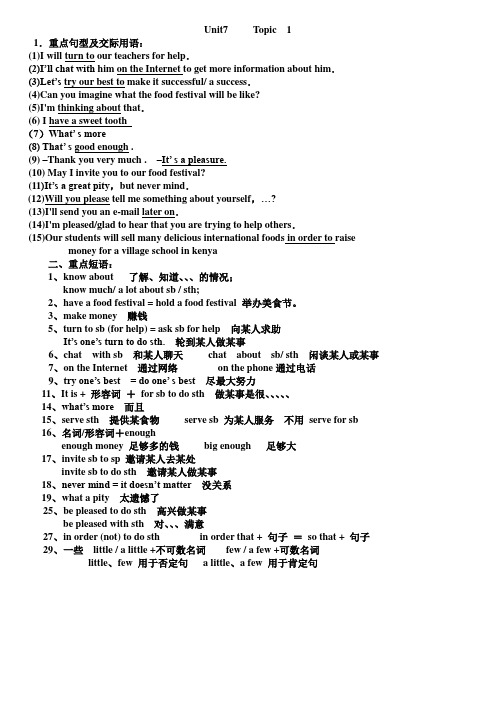
Unit7 Topic 11.重点句型及交际用语:(1)I will turn to our teachers for help.(2)I’ll chat with him on the Internet to get more information about him.(3)Let’s try our best to make it successful/ a success.(4)Can you imagine what the food festival will be like?(5)I'm thinking about that.(6) I have a sweet tooth(7)What’ s more(8) That’ s good enough .(9) –Thank you very much . –It’ s a pleasure.(10) May I invite you to our food festival?(11)It’s a great pity,but never mind.(12)Will you please tell me something about yourself,…?(13)I'll send you an e-mail later on.(14)I'm pleased/glad to hear that you are trying to help others.(15)Our students will sell many delicious international foods in order to raisemoney for a village school in kenya二、重点短语:1、know about 了解、知道、、、的情况;know much/ a lot about sb / sth;2、have a food festival = hold a food festival 举办美食节。
仁爱版八年级下册英语知识点

仁爱版八年级下册英语知识点
1. 常见时态:一般现在时、一般过去时、现在进行时、过去进行时、一般将来时、过去完成时、现在完成时、将来完成时。
2. 祈使句:表示命令、请求、建议等的句子。
3. 被动语态:动作的承受者(也就是主语)被提前,动作的执行者(也就是谓语动词)则用过去分词。
4. 疑问词:疑问词是用来引导疑问句的词语,如what, who, when, where, why, how等。
5. 冠词:a, an, the三个冠词,分别表示不定冠词、定冠词。
6. 感叹句:用来表达强烈的感情或者情感,以感叹号结尾。
7. 介词短语:由介词和它后面的宾语组成,用来修饰或补充动词、名词、形容词或者副词。
8. 大写字母:英语中,人名、地名、节日、专业术语、品牌名称、书名等都需要使用大写字母。
9. 句子成分:主语、谓语、宾语、表语、定语、状语、补语等。
10. 一些重点词汇:如动词、名词、形容词、副词、代词等。
常见的重点词汇还有表示数量的词汇、时间词、地点词、情感词等。
仁爱版八年级册英语知识点汇总(完整版)
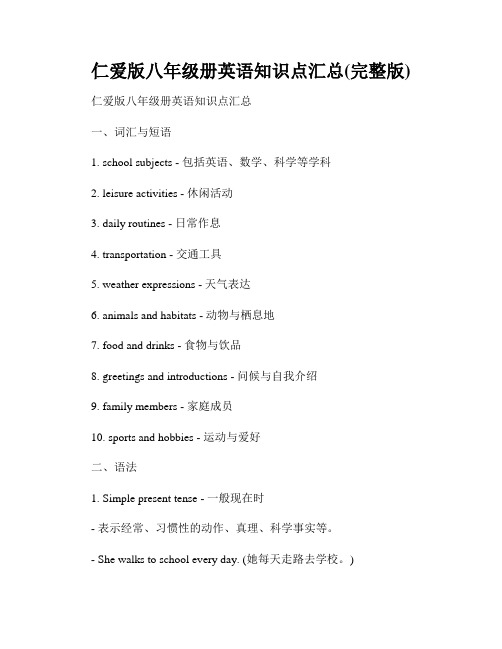
仁爱版八年级册英语知识点汇总(完整版)仁爱版八年级册英语知识点汇总一、词汇与短语1. school subjects - 包括英语、数学、科学等学科2. leisure activities - 休闲活动3. daily routines - 日常作息4. transportation - 交通工具5. weather expressions - 天气表达6. animals and habitats - 动物与栖息地7. food and drinks - 食物与饮品8. greetings and introductions - 问候与自我介绍9. family members - 家庭成员10. sports and hobbies - 运动与爱好二、语法1. Simple present tense - 一般现在时- 表示经常、习惯性的动作、真理、科学事实等。
- She walks to school every day. (她每天走路去学校。
)- Water boils at 100 degrees Celsius. (水在100摄氏度沸腾。
)2. Comparative and superlative adjectives - 比较级和最高级形容词- 用于对两个或多个事物进行比较。
- This book is more interesting than that one. (这本书比那本书更有趣。
)- He is the tallest student in our class. (他是我们班最高的学生。
)3. Present continuous tense - 现在进行时- 表示当前正在进行的动作或临时状态。
- They are playing basketball in the park. (他们在公园打篮球。
)- I am studying for the exam this weekend. (我这周末正在备考。
仁爱英语八年级下册知识点归纳

千里之行,始于足下。
仁爱英语八年级下册知识点归纳以下为仁爱英语八年级下册的知识点归纳:
1. 时态:
- 一般现在时
- 现在进行时
- 一般过去时
- 过去进行时
- 一般将来时
2. 被动语态
3. 从句:
- 定语从句
- 名词性从句(主语从句、宾语从句、表语从句)
- 状语从句
4. 祈使句
5. 反义词、近义词和词组
6. 量词和复数形式
7. 条件句
8. 连词和连词短语
第1页/共2页
锲而不舍,金石可镂。
9. 形容词和副词的比较级和最高级
10. 语法填空
11. 定语从句的引导词
12. 比较级和最高级的形式和用法
13. 动词不定式的主动形式和被动形式的用法
14. 情态动词和情态动词的用法
15. 比较级和最高级的表示方式
16. 动词和名词的转换
17. there be句型的用法
18. 间接引语和直接引语的变化规则
以上是仁爱英语八年级下册的一些知识点,希望对你有所帮助。
如有其他需求,请随时告诉我。
初二下册英语语法知识点总结归纳仁爱版
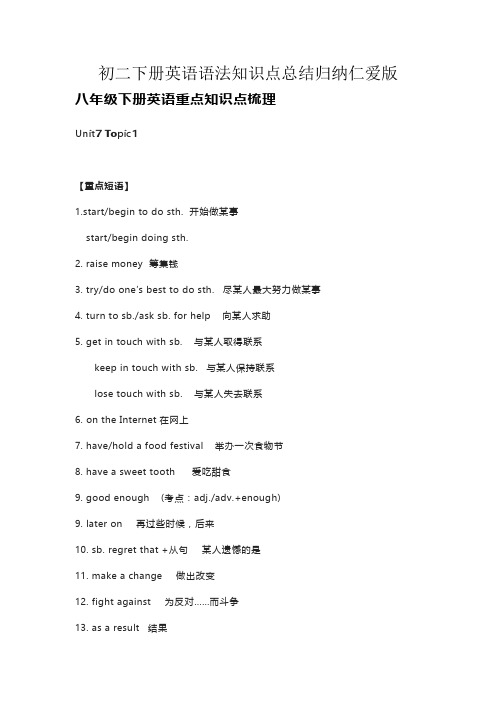
初二下册英语语法知识点总结归纳仁爱版八年级下册英语重点知识点梳理Unit7 Topic1【重点短语】1.start/begin to do sth. 开始做某事start/begin doing sth.2. raise money 筹集钱3. try/do one’s best to do sth. 尽某人最大努力做某事4. turn to sb./ask sb. for help 向某人求助5. get in touch with sb. 与某人取得联系keep in touch with sb. 与某人保持联系lose touch with sb. 与某人失去联系6. on the Internet在网上7. have/hold a food festival 举办一次食物节8. have a sweet tooth 爱吃甜食9. good enough (考点:adj./adv.+enough)9. later on 再过些时候,后来10. sb. regret that +从句某人遗憾的是11. make a change 做出改变12. fight against 为反对……而斗争13. as a result 结果14. child workers 童工15. thank you for doing sth.因为做某事而感谢某人16. make one’s dream come truerealize / achieve one's dream使某人的梦想实现【词形转换】1. success n.成功, 胜利succeed v.successful adj.2. west n.西方,西部western adj.西方的,西部的3. Greece n.希腊Greek adj.希腊的 n.希腊人4. India n.印度Indian adj.印度的,印第安人的n.印度人,印第安人5. fry v.油炸,油煎fried adj. 油炸的6. Italy n.意大利Italian adj.意大利(人)的,意大利语的n.意大利人,意大利语7. Africa n.非洲African adj.非洲的,非洲人的n.非洲人8. Russia n.俄国Russian adj.俄国(人)的,俄语的n.俄国人,俄语【重点句型】1. When and where shall we have the food festival?我们什么时候在哪儿举办食物节?2. Let’s try our best to make it a success.让我们尽我们做大的努力使它成为一件成功的事情。
八年级英语下册 语法归纳大全 仁爱版
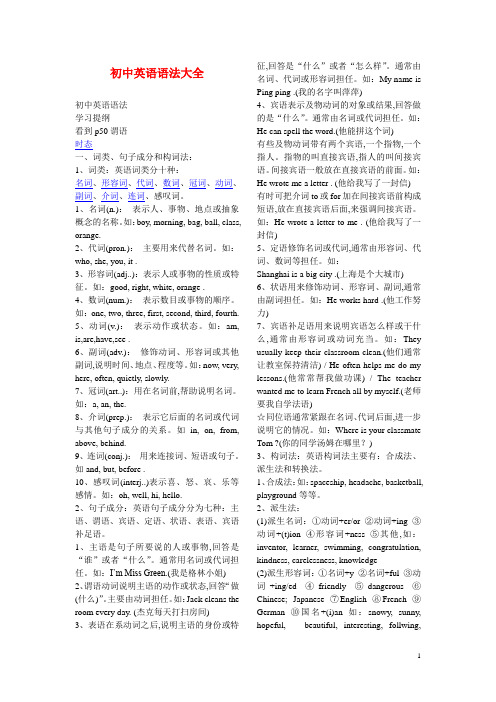
初中英语语法大全初中英语语法学习提纲看到p50谓语时态一、词类、句子成分和构词法:1、词类:英语词类分十种:名词、形容词、代词、数词、冠词、动词、副词、介词、连词、感叹词。
1、名词(n.):表示人、事物、地点或抽象概念的名称。
如:boy, morning, bag, ball, class, orange.2、代词(pron.):主要用来代替名词。
如:who, she, you, it .3、形容词(adj..):表示人或事物的性质或特征。
如:good, right, white, orange .4、数词(num.):表示数目或事物的顺序。
如:one, two, three, first, second, third, fourth.5、动词(v.):表示动作或状态。
如:am, is,are,have,see .6、副词(adv.):修饰动词、形容词或其他副词,说明时间、地点、程度等。
如:now, very, here, often, quietly, slowly.7、冠词(art..):用在名词前,帮助说明名词。
如:a, an, the.8、介词(prep.):表示它后面的名词或代词与其他句子成分的关系。
如in, on, from, above, behind.9、连词(conj.):用来连接词、短语或句子。
如and, but, before .10、感叹词(interj..)表示喜、怒、哀、乐等感情。
如:oh, well, hi, hello.2、句子成分:英语句子成分分为七种:主语、谓语、宾语、定语、状语、表语、宾语补足语。
1、主语是句子所要说的人或事物,回答是“谁”或者“什么”。
通常用名词或代词担任。
如:I‘m Miss Green.(我是格林小姐)2、谓语动词说明主语的动作或状态,回答“做(什么)”。
主要由动词担任。
如:Jack cleans the room every day. (杰克每天打扫房间)3、表语在系动词之后,说明主语的身份或特征,回答是“什么”或者“怎么样”。
八年级下册仁爱版英语知识点总结

八年级下册仁爱版英语知识点总结Unit 5 Topic 1 You look excited.一、重点单词。
1. excite (v.) 使激动;使兴奋,其形容词形式有 excited(感到兴奋的,常修饰人)和 exciting(令人兴奋的,常修饰物)。
例如:The news is exciting. I'm excited about it.2. smell (v.) 闻起来;(n.) 气味。
作系动词时,后接形容词。
如:The flowers smell sweet.3. seem (v.) 似乎;好像,常见结构为seem + (to be) + 形容词/名词/动词不定式。
例如:He seems (to be) happy. He seems to like reading.4. invite (v.) 邀请,invite sb. to do sth. 邀请某人做某事。
如:I invited him to come to my party.5. disappoint (v.) 使失望,其形容词形式为 disappointed(感到失望的,常修饰人)和 disappointing(令人失望的,常修饰物)。
例如:The result is disappointing. I'm disappointed with it.二、重点短语。
1. invite sb. to... 邀请某人去……,如invite sb. to my birthday party。
2. one of + 复数名词……之一,例如:One of my friends likes reading.3. be proud of... 为……感到骄傲,如:I'm proud of my mother.4. be able to... 能够,相当于can,但be able to有更多的时态变化。
例如:He was able to swim when he was five.三、重点句型。
八年级英语下册 语法归纳大全 仁爱版

初中英语语法大全初中英语语法学习提纲看到p50谓语时态一、词类、句子成分和构词法:1、词类:英语词类分十种:名词、形容词、代词、数词、冠词、动词、副词、介词、连词、感叹词。
1、名词(n.):表示人、事物、地点或抽象概念的名称。
如:boy, morning, bag, ball, class, orange.2、代词(pron.):主要用来代替名词。
如:who, she, you, it .3、形容词(adj..):表示人或事物的性质或特征。
如:good, right, white, orange .4、数词(num.):表示数目或事物的顺序。
如:one, two, three, first, second, third, fourth.5、动词(v.):表示动作或状态。
如:am, is,are,have,see .6、副词(adv.):修饰动词、形容词或其他副词,说明时间、地点、程度等。
如:now, very, here, often, quietly, slowly.7、冠词(art..):用在名词前,帮助说明名词。
如:a, an, the.8、介词(prep.):表示它后面的名词或代词与其他句子成分的关系。
如in, on, from, above, behind.9、连词(conj.):用来连接词、短语或句子。
如and, but, before .10、感叹词(interj..)表示喜、怒、哀、乐等感情。
如:oh, well, hi, hello.2、句子成分:英语句子成分分为七种:主语、谓语、宾语、定语、状语、表语、宾语补足语。
1、主语是句子所要说的人或事物,回答是“谁”或者“什么”。
通常用名词或代词担任。
如:I’m Miss Green.(我是格林小姐)2、谓语动词说明主语的动作或状态,回答“做(什么)”。
主要由动词担任。
如:Jack cleans the room every day. (杰克每天打扫房间)3、表语在系动词之后,说明主语的身份或特征,回答是“什么”或者“怎么样”。
仁爱版英语八年级下册总复习材料

Unit 51. invite sb. to do sth. 邀请某人去做某事invite sb. to swh. 邀请某人去某地2.表水平:be able to do sth. could/can + v.原形3. say thanks/hello/sorry/goodbye to sb. 向某人道谢/问好/道歉/道别4. a ticket to/for ... :...的票/入场券be proud of sb. 骄傲,自豪5. cheer up 使振作起来cheer on 加油6. on one’s way to + 地点(后接地点副词home/here/there,to省略)7. 系动词+adj. (系动词有:seem、sound、feel、taste、look、smell、be等)8. lonely 孤独的alone 独自、单独care for / take care of / look after 照顾9. 因为:because of+名词/代词/名词短语because+从句10. teach sb. to do sth. 教某人去做某事11. be full of = be filled with 充满,装满12. agree /disagree with sb. 同意/不同意某人的观点13. make peace with sb. 与某人和解come into being 形成,产生14. find a way to do sth. 找到做某事的方法15. be popular with sb. 受某人欢迎16. do badly in (doing) sth.在某方面做得不好→ do well in / be good at (doing) sth. 擅长于17. be strict with sb. 对某人严格要求be strict about sth. 对某事严格要求18. Take it easy. 别紧张。
- 1、下载文档前请自行甄别文档内容的完整性,平台不提供额外的编辑、内容补充、找答案等附加服务。
- 2、"仅部分预览"的文档,不可在线预览部分如存在完整性等问题,可反馈申请退款(可完整预览的文档不适用该条件!)。
- 3、如文档侵犯您的权益,请联系客服反馈,我们会尽快为您处理(人工客服工作时间:9:00-18:30)。
最新仁爱版八年级英语下册期末总复习知识点汇总教学内容一、重点单词短语及其用法Unit 51.You look excited\angry\disappointed\upset\frightened. 你看起来兴奋/生气/失望/烦躁/惊恐。
2.感官系动词:look 看起来smell闻起来taste尝起来sound 听起来feel 摸/感觉起来3.系表结构:系动词+形容词go mad get wet get angry turn green fall asleepfeel a little more(confident\ comfortable) be lost=get lost4.go to the movies=go to the cinema=watch\see a film 看电影5.one of + 可数的复数形式It’s one of my favorite movies.6.prepare…for…为……做准备 6.say thanks to sb. 向某人致谢7.be popular with 受……欢迎8.be kind\ cruel to sb. 对某人友好|残忍9. a ticket to………的入场券10.set the table 摆放餐具11.seem +adj.\n.\to do sth. It’s seems that……12.We are moved by the moving story. 前者修饰人,后者修饰物13.be proud of be pleased with be worried about be excited about \at sth. be sorry forbe interested in sth. be grateful to sb. be strict with sb. be strict about\in sth.be angry with\at sb. be angry at\about sth. be nervous about be tired of sth.=be bored with sth. be surprised at sth. be surprised to do sth. be afraid of (doing) sth14.can(not)=be(not)able to will be able to(其将来时)15.have a temperature \fever发烧16.ring sb. up=call sb. 给某人打电话17.care for=take care of=look after 照顾18.on the way to ……在去……的路上18.feel lonely live alone 前者形容词修饰系动词,后者副词修饰动词19.because of +n.\代词|名词短语because+句子20.on+具体描述的时间段21.fall into 掉入fall down 倒塌22.in the end=at last=finally 最后e into being 形成、成立于(一般为过去式came)24.be full of=be filled with 充满了,被填满了25. make peace with 与某人和解1.do well\ badly in 在……做得好|不好2.have a talk with sb. 与某人交谈3.at one’s age 在某个年纪4.make friends with sb. 与某人交朋友4.tell jokes 讲笑话5.fail the exam= not pass the exam考试不及格5.some suggestions=some pieces of advice 一些建议(前者可数,后者不可数)6.happen to sb.\sth. (事情)发生在……身上happen to do sth. 碰巧7.take part in activities 8.with the help of sb. 9.clap one’s hands鼓掌10.make faces 做鬼脸11.all the time 一直12.take a wlk=go for a walk 散步1.calm down2.at the end of the months在月末3.smile at life笑对人生4. learn by oneself=teach oneself 自学learn sth. from sb.向某人学习5. get along(well)with sb. 与某人相处(融洽)6.put on a play 上演剧目7.in a bad\good mood in good\bad health in good\bad\high\low spirits8.make+宾语+do\adj.\n. make her laugh\excited\monitor let sb. do sth.9.get together with sb. 与某人团聚10. get bake to sth. 回到某事上11.bring bake a sense of happiness找回快乐的感觉Unit 6 topic 11.go on a three-day visit a one-meter-tall boy2. find out 查明3. make a decision=decide to do sth. 做决定4. hard \soft sleeper 硬|软卧5.at the price of 60 yuan6.in bad\good condition 条件糟糕|好7.arrive at+小地方in+大地方= reach to = get to8. total cost总花费9. book a room=make a room reservation 预定一个房间10. tell|ask sb. (not) to do sth.11.a room without a bathroom or air conditioning 12.a standard room for one person13.work out the cost of the trip计算work out the problem 解决14. come up with an idea提出15.each≥2(river\street)every≥3 either(两者之一) both=2 all≥3(肯定) none≥3(否定)16.be drawn 被抽到nd safely 18.have a good rest好好休息19.in the open air在户外20. an exciting experience have no experience (前者经历、可数,后者经验、不可数)21. places of interest 名胜古迹22.local people strangerTopic 21.be busy (in) doing sth.忙于做某事2. on vacation 在度假3.help sb. (to) do sth.4.make a plan plan to do sth. 计划做某事5. come along with sb.跟随某人6.at the foot \top of 在……的脚下|顶上7.spread over an area of 40 km28. at the beginning of 在……的开始9. by the way顺便问一下10.take out 拿出来11.on both sides of on each\either side of 12.tell good from bad 辨别好坏13.in on to 的区别14.pull-push拉-推15.step on 16.in all directions 四面八方17.look for space to park bikes 18. walk through the passage 19.take photos拍照片20. push one’s way out挤开、推进(道路)21.out of sight看不见22.get on\off上|下车23.can’t help doing sth. 忍不住做某事24.shout at sb. to do sth .25.have fun doing sth.高兴地做某事26. realize one’s dream=come true27.everywhere= here and there 28. especially 29. make sure确保Topic 31.a traffic accident 交通事故2.Many passengers were hurt. be badly hurt= hurt……badly3.be crazy about sth. 热衷于be crazy about sb. 迷恋、爱上.4.cause air pollution造成空气污染5.get used to doing sth. 习惯于做某事used to do sth. 过去常常做某事6..in public 在公共场合7.die(动)dead(形)death(名)8.slow down 减速9.the opposite direction相反的方向10.avoid doing sth. 避免做某事11.run into 撞到12.rush to冲向13.careful-careless 细心-粗心carefully-carelessly14.get a fine 罚款15.in danger处于危险中16. instead of doing sth 而不是……17.warn sb. (not) to do sth. 警告、提醒某人(不)做某事warn about\of against sth.。
